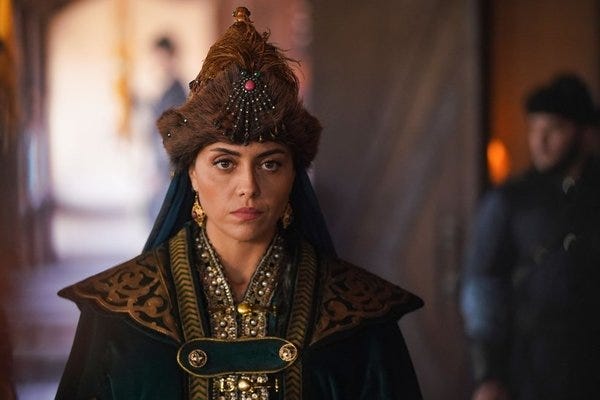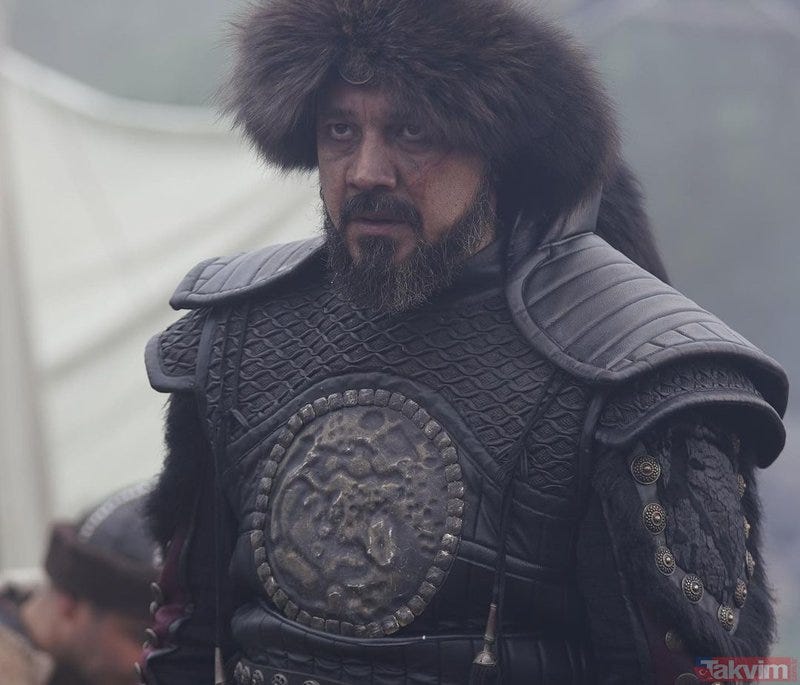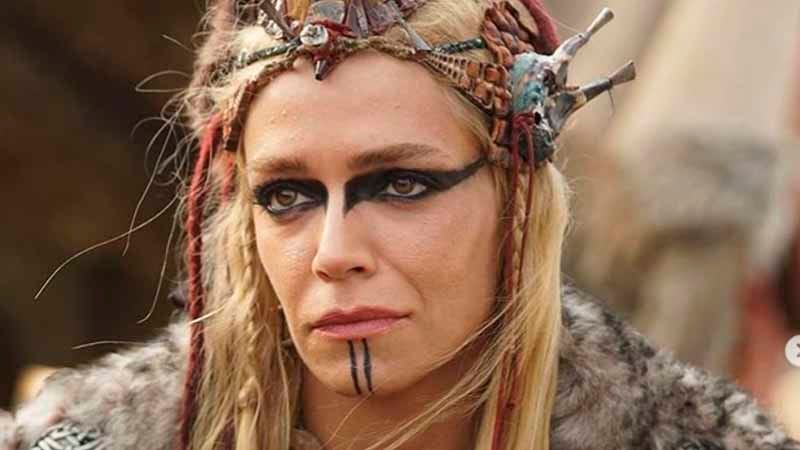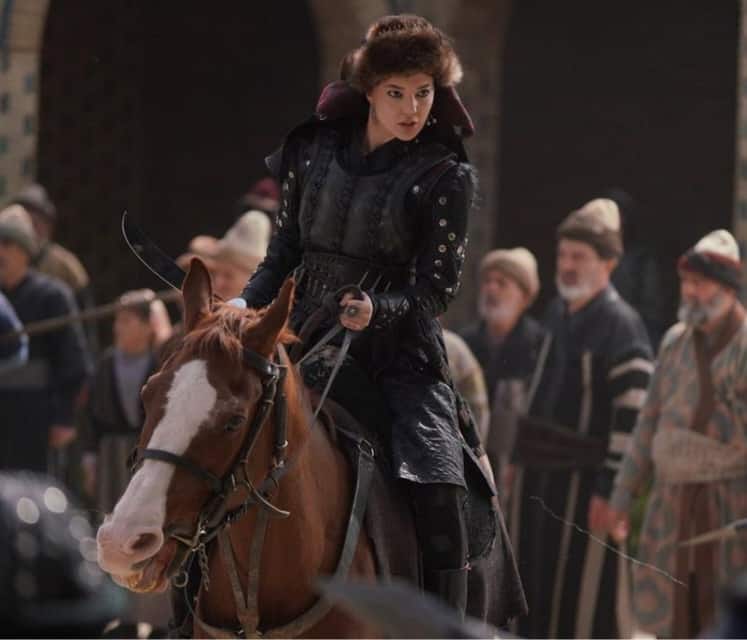This season was quite the roller coaster as they all are going back to the Ertugrul series. As usual, we have about 3-4 story lines that are each dealt with one at a time. When one is concluded the other picks up. The Turks expect soemthing of their viewers, and the Osman/Ertigrul (not to mention Alparslan) series do that. They do not pander so much to audience and the lowest common denominator like the CIA Hollywood. No dumbing down here. And their audience is in the hundreds of millions. They have maintained their rank as the most popularly watched series in the world.
Some tedious acknowledgments: Of course there is the romance, and injected humor, which at times detracts from the series and seems out of place, but it is all to serve the mission—the retVrn of an honorable Islam, and the revival of the old ways in Turkish culture. As I have noted, Erdogan and Bozdag have met their own lefty/liberal factions in their country head on. Even in the East, higher ed is filled with rank and file liberals who hate the old ways and love globalism. As a class they are no differnt than the cowards who fill our academic ranks in the USA. At any rate, what Erdogan is doing is impressive.
I should note the historical timeline that this season followed. Some of it takes liberty of how things developed. This is because we lost a lot of the history in the middle ages. That void allows Bozdag to wax poetic, and in this sense it serves an excellent purpose. I should also note that there may be evidence for some of the historical explanations of things in Turkish literature, histories, etc. But much of that has not been translated into English [like the Book of Dede Korkut] so I cannot say definitely what is actually true and what departs from it and is poetic license.
The two antagonists are the Byzantines and the fellow Turks who have sold out their faith and their people to the Mongols. The actual history is that the Mongols deposed to exile Sultan Mesud and elevated his nephew, Aladdin or Kayqubad III. The latter was a puppet of the Mongols, and sold out his own people in order to gain Mongol favor. He was also quite cruel to his own people.
This is against Allah. It is also absent the daring resistance (courage) needed for the Turks to create an independent state. In reality Aladdin was a cruel young man (likely a teenager at the time) who sought to defy the rise of the Turks and hold on to his own Mongol controlled Seljuk rule. In the series his mother is the most evil of all and manipulates her son. She is Ismihan.

It is likely not historical fact that Ismihan was this powerful or quite the central figure. But in the series she conspires to kill Osman, and poisons his sons. The historical record shows that Kayqubad III was hung by the Mongols and Mesud was reinstalled. In the series, Kayqubad III simply disappears after being overthrown by Osman who installs Mesud himself.
The ascension of Mesud for a second time leads to the rise of Osman’s independent beylic and hence puts the Turks on the threshold of statehood. How does that happen? By prior agreement between Osman and Mesud, the sultan would implore all Turks to rally behind Osman. This promise is fulfilled so by the end of Season 4, Osman is independent bey and the Seljuk state is dead.
I will skip over the use and abuse of Viking invaders for Byzantine purposes to defeat Osman. One such Viking converts to Christianity because he believes his gods are not as strong as the Christian God. This upsets his cruel and deadly girlfriend Frigg, who remained pagan. They are both dispatched by Osman along with the Byzantine regional ruler who is beheaded in fabulous fashion, and the storyline dies with them.
I will also skip over how Osman saved the life of the Byzantine emperor in Constantinople, and how he then betrays him. By the end of the season the emperor is preparing for a great war, and Osman is preparing to ride east to the shores of the Hagia Sophia.
Nayman, ends up defeated at the end of the series, and is turned over to a Muslim convert Mongol, Ghazan Khan. But not so fast, He escapes and Osman has to track him down again. This time Osman asserts his authory and defies Ghazan Khan, and beheads him himself:
This act separates the Turks from all forms of Mongols, even those who have converted. It is the beginning of the end for the Mongols in Anatolia.
Nayman was real or a stand in character for the Naimans who were Mongol of sorts but in rebellion. It is unclear to me, and this (below) tries to shed light on it:
What is most remarkable about all this is that the East is quite interested in their heritage, and their history. If only the USA was such. Here, we love to destroy our history. In the East it is seen as honorable and worthy of emulation in the character of their Founders. This is called winning.
In a quite enlightening part of the season, ep 128, Kumral Abdal (who is historically real and was Sheyah Edebali’s best student) has a discussion with Osman’s sons…on Aristotle. Ok it is not specifically on Aristotle by name, but it hits upon him in topic.
When Osman’s sons bring bags of grain to Abdal, they are dismayed. The merchants are cheating the people by filling the bags with grain and rocks. Aladdin is offended because people are cheating on each other. How can there be a state when people do this?! he asks.
Aladdin: We can’t have a state [with these people].
Abdal: Of course we can. No matter how much you try to remove the rocks, there will always be rocks within the grain. But we keep removing the rocks anyway.
…….
Time is Allah’s to give Orhan. All men are Allah’s as well. But know that nothing is because of the time; nothing is a waste of time. Just like how one mountain’s water is similar to another one, humans, despite where they live are similar to each other.
In the Politics, Aristotle makes mention that talents and other meritorious attributes are clearly seen, but not the soul—which is more difficult to discern by humans. Abdal is saying something like that. Man has a Nature that is not specific to place or time. Nature of man IS. And we notice here, that the addition of Nature is the open claim that Allah’s revelation and Nature go together. Reason AND revelation are, if not one, compatible.
In the last episode, Nature returns:
Abdal: Osman Bey won against them all. He conquered so many. He made so many infidels’ land ours. But he never hurt any innocent people on those lands. Osman Bey obeyed the Sunnah [ed. essentially the way one should practice personal morality]. He ruled with mercy with the eyes that looked at the world with the love of Allah. Our prophet got up and showed respect when he saw a Jewish Funeral. He knew that living together was only possible through treating each other as equal. The same way he cared about the problems inside mosques, he also cares about the problems of people inside churches and other places too. He helped them. Oh he does invite them over in the meantime. We all do. We invite and tell them about Islam. Those who agree join us, and those who don’t can live with us as long as they repect out beliefs. We don’t force Islam on anyone. We show mercy to those who show it back. We treat everyone the way they treat us. We keep our swords on the oppressors, and our support over the innocent. We follow our prophet’s Sunnah. And whoever follows his sunnah keep walking on Allah’s path no matter how hard you try to push them away...
Malhun Hatun: We are so lucky Ummah! The Messenger’s words solve all our problems. They even help out those who don’t believe in him.
Abdal: that can only lead to peace. May Allah keep Osman Bey’s Beylic within that peace…
Ghazan Khan Daughter, Esrigūn: How can you keep it up being both mother and fighter.
Malhun: Don’t you think about getting married?
Ghazan Khan Daughter, Esrigūn: I don’t. My Sword….
Malhun: …No one will tell you to drop it. But Motherhood is in a Hatun’s nature.
The question of what equal and respect means is a hinge-all in terms of the practical arrangement of government. However, there can be no doubt that the aim here is to moderate Islam by ridding it of its radicals. Success does not mean submission for everyone politically. It does mean conquering lands and bringing it under the shade-tree of Islam. This is the argument as I understand it.
Turkish celebration of women is not western, nor woke, nor laden with liberal pap. The Turkish women are fierce warriors (this is true to the history), but also the bedrock of the home. Malhun notes, that women are by Nature this way. There is no trans monstrosity here—there are men and women, and women are the base of the Muslim home, and the new Turkish state. Allah, and Nature, has made it so this way. To fulfill one’s Nature, then, is a part of this life in order to be happy, and not shameful to oneself.
Look for Esrigun to marry. It will likely be to Boran.
The Osman series requires something from its viewers, and it is far more serious than anything coming out of the west. MashAllah.





